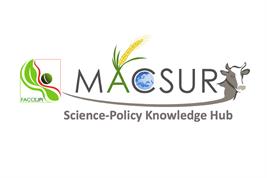16.07.2021
Press release

In order to achieve the climate goals of the European Green Deal and the Paris Agreement, it is important that research findings are incorporated into political strategies. In the MACSUR SciPol project, ten scientific institutions are planning to establish a hitherto missing interface between policy and science for the agri-food sector at a European level. The project is a model for an institutionalized form of scientific policy consultation. MACSUR SciPol was launched in June 2021 under the coordination of the Leibniz Centre for Agricultural Landscape Research (ZALF) with a kick-off workshop and will run as a pilot project for 18 months.
Agriculture and food systems are affected by the impacts of climate change while at the same time generating not insignificant greenhouse gas emissions. Through the Paris Agreement and the European Green Deal, the EU aims to reduce greenhouse gas emissions to at least 55 percent below 1990 levels by 2030 and achieve greenhouse gas neutrality by 2050. The MACSUR pilot project creates a forum that will support policy actors with scientific expertise to implement these climate targets and effective measures to address climate change in the European agri-food sector. The core output of the MACSUR SciPol is an established procedure of science-based responses to policy questions.
Prof. Katharina Helming, project leader of MACSUR SciPol at the Leibniz-Centre for Agricultural Landscape Research (ZALF), clarified the special approach of the project in the kick-off workshop at the end of June: "We have observed that not even excellent research always manages to make the transfer to policy. The project closes this gap by taking a different approach. MACSUR SciPol specifically addresses policy questions on climate protection and climate change in agriculture and provides the relevant scientific answers. We do not wait until policymakers approach us as scientists with questions, but rather gather the questions directly from the policy-making processes in the participating countries. In this way, we develop consultation approaches that are tailored to science."
MACSUR SciPol emerged from the MACSUR network of the Joint Programming Initiative for Agriculture, Food Security and Climate Change (FACCE-JPI) of the Council of the European Union and participating member states.
Addressing policy questions
The special feature of this research project is the close cooperation between research and policy. As a starting point specific key questions posed by European policy representatives on agriculture, nutrition and climate change, each from a country-specific perspective, have been collected. This list of questions is divided into three thematic areas. The first set of topics addresses mitigation issues, i.e., strategies for reducing emissions from agriculture, livestock, and at the consumer level, as well as carbon sequestration. The second set of topics covers strategies for adapting to the impacts of climate change. The third thematic area discusses the potential impacts of the recommended climate mitigation and adaptation strategies on humans and animals, ecosystems and biodiversity, social equity, and food security, among other things.
Model-generated knowledge and interdisciplinary collaboration
To provide adequate answers to these questions, MACSUR SciPol draws on research knowledge generated from scientific models. Models make it possible to estimate future yields under the influence of climate change or to calculate greenhouse gas emissions generated in agriculture and food production right up to the consumer. "As far as model-generated knowledge is concerned, the project can draw on the combined modeling skills from the MACSUR network and FACCE JPI," emphasized
Prof. Frank Ewert, Scientific Director of ZALF and current Chair of the FACCE JPI Scientific Advisory Board at the MACSUR SciPol kick-off workshop in June.
The project takes a transdisciplinary, participatory approach. To support the policy decisions, above and beyond the close cooperation between research and policy, representatives from agriculture, civil society and nature conservation are involved in multi-stakeholder dialogues. The project's scientific network currently consists of project partners from different disciplines in eight European countries. The Global Research Alliance on Agricultural Greenhouse Gases supports the project and acts as an observer organization for MACSUR SciPol.
Project partners:
- Coordination: Leibniz Centre for Agricultural Landscape Research (ZALF), Germany
- Thünen Institute, Federal Research Institute for Rural Areas, Forestry and Fisheries, Germany
- Aarhus University, Denmark
- Research Institute of Agricultural Economics, Hungary
- The Irish Agriculture and Food Development Authority (Teagasc), Ireland
- University Of Florence, Italy
- University of Birmingham, United Kingdom
- Queen's University Belfast, Northern Ireland
- Stichting Wageningen Research, The Netherlands
- University of Natural Resources and Life Sciences, Vienna, Austria
Network partners:
- Institute for Rural and Regional Research, Norway
- Agricultural Research and Development Station, Romania
- Faculty of Agricultural Sciences, National University of Córdoba, Argentina
- French National Research Institute for Agriculture, Food and Environment, France
- Austrian Institute of Economic Research, Austria
Funding notice:
Federal Office for Agriculture and Food (Germany), Aarhus University (Denmark), Research Institute of Agricultural Economics (Hungary), Department of Agriculture, Food and the Marine (Ireland), Ministry of Agricultural, Food and Forestry policies (Italy), Department for Environment, Food and Rural Affairs (United Kingdom), Ministry of Agriculture, Nature and Food Quality (Netherlands), Federal Ministry of Agriculture, Regions and Tourism (Austria), Research Council of Norway (Norway), French National Research Institute for Agriculture, Food and Environment (France), Global Research Alliance (Secretariat hosted by New Zealand Ministry for Primary Industries, New Zealand)
 Press release in PDF-format
Press release in PDF-format
Further information:
Pictures
For downloading the pictures please click on a picture and use the icon.


The MACSUR SciPol project provides scientifically based responses to policy questions on dealing with climate change and climate protection in the agri-food sector. In this way, the project closes a previously existing gap between research and policy. Source: © Pixabay.
